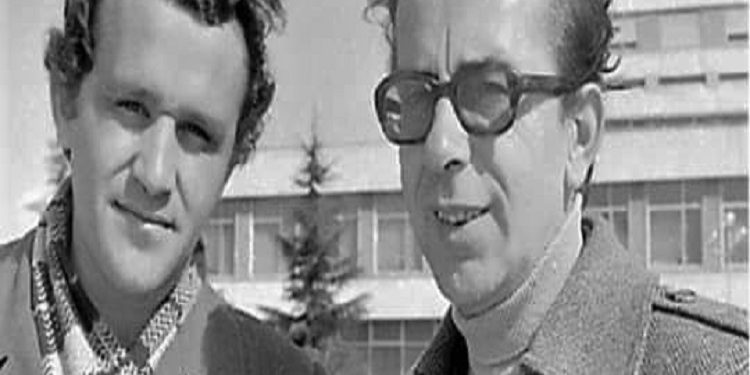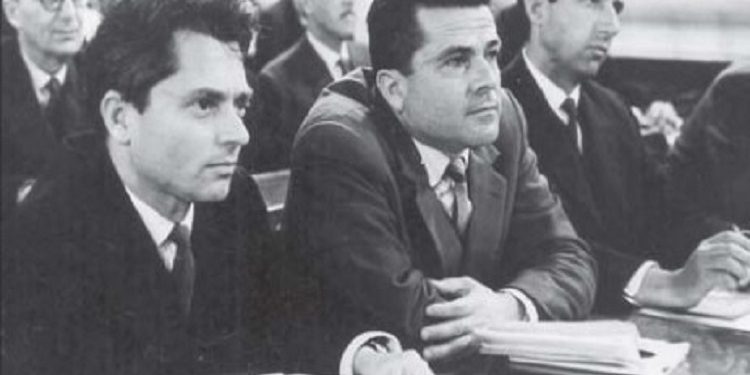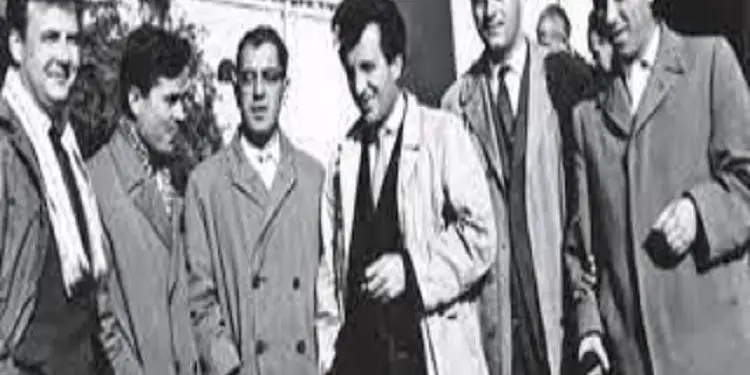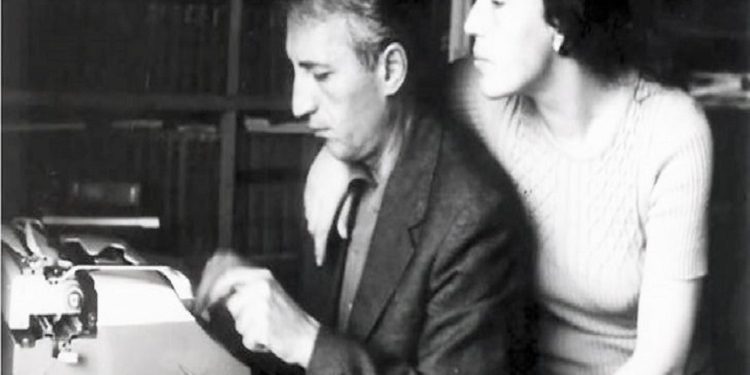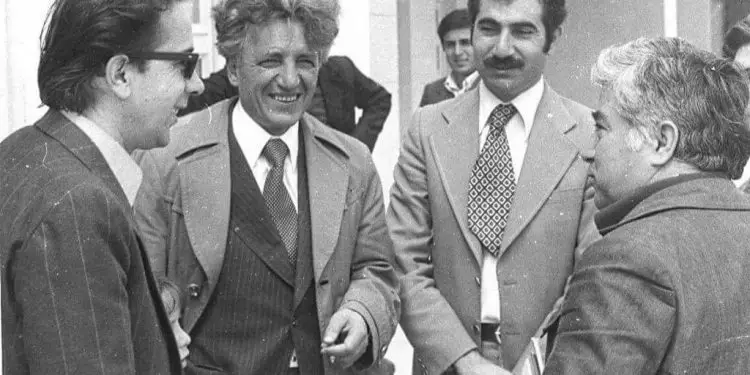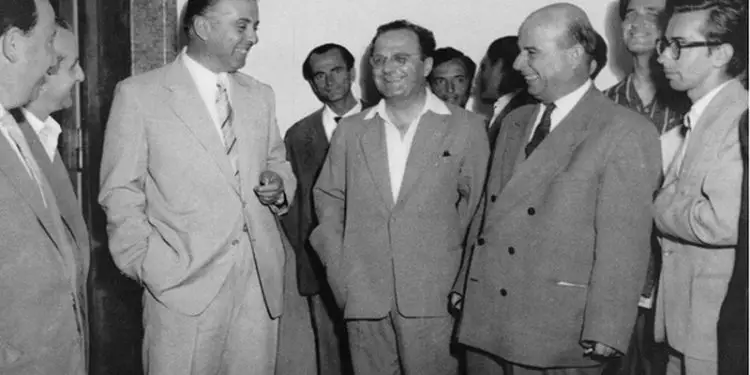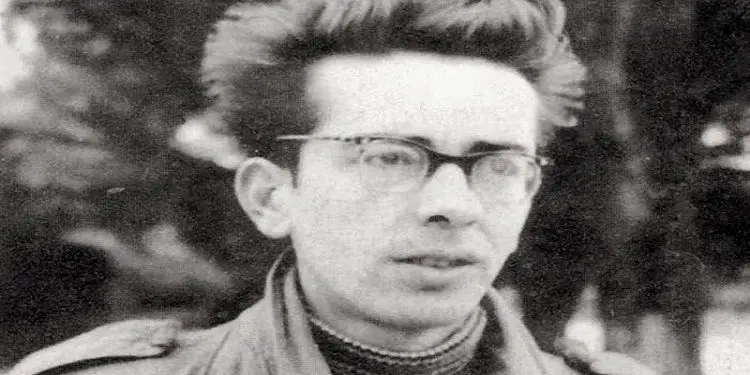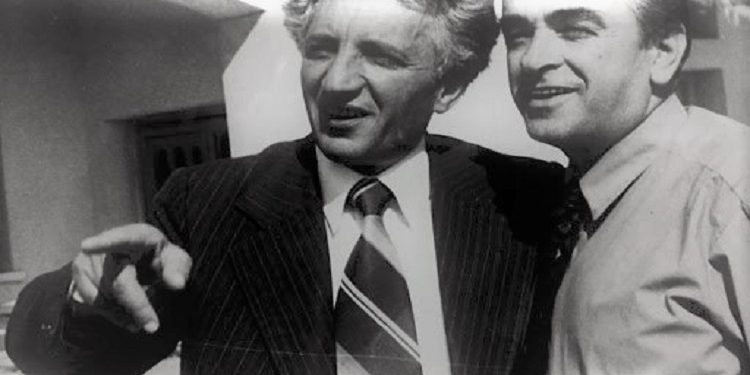Skifter Këlliçi
The fourth part
-Piece of events from a historic meeting, with the participation of the dictator-
July 11, 1961, so 61 years ago…!
Enver Hoxha, although it was not announced that he would participate, suddenly came to a meeting with the intelligence of Tirana, where disturbing problems that had arisen in Albanian poetic creativity were discussed. Not only that, but from an attentive listener to the discussions of affirmed communist poets who harshly criticized young poets, who sought new paths and means of expression in poetic creativity, as well as an equally attentive listener to the answers of the latter. , strangely became a “judge” to establish peace between them. And this for reasons that will stand out in this dossier writing in some issues.
Continued from the previous issue
Prologue
He holds the same attitude towards the poetry of Dritëro Agolli and Fatos Arap. Evaluating Agolli as “one of the most talented poets”, since in his first volume “I went out on the street”, Gurakuqi, suddenly notices that “he too has started to be caught after searching for the figure”. And as an example of this take the verses:
“The fog lifted and roamed the citizens /
just like an old woman /
when the river overflows ”.
And below:
“And the sad leaves were thrown by the grove /
as the word idyll /
as a gazelle word… ”.
Mark Gurakuqi calls all these findings, which are still hit today, as figures that are imperceptible and illogical to look for, because “what has the fog got to do with the old woman’s cheeks” (ibid.).
Below in his article, he does not spare even Fatos Arap, who must be said that by that time he had not yet published his first poetic volume, but had attracted the attention of critics and readers with the poems struck in the literary press.
Mark Gurakuqi describes the Arab as a poet “who is not preconceived and does not enjoy much”, because he encounters “traces of a vague poetic perception, where the figure is not in function of the idea”. (Yes there).
It is unfortunate, but it must be said that in this long study article certain envy was expressed, as a friend of mine later told me, who also became the head of the poetry editorial office at the Publishing House “Naim Frashëri” in Tirana. Gurakuqi, according to him, and other old poets, envied the young poets, not because they used figures, which led to “mannerisms”, but because they themselves were no longer able to create poems with such figures.
Of course, as Agim Vinca points out – “audatur et altera pars”, (Latin expression: “Let the other party be heard as well.”)
Last part
And the other party does not hesitate to respond!
Agolli against Gurakuqi
It was Dritëro Agolli who responded to Mark Gurakuqi in an article with a very meaningful title: “Traditions, of course, but not prints”, published in the newspaper “Drita”, on August 27, 1961.
This was the first serious critical article published by our young poet, at that time a journalist of “Zeri i Popullit”. And, what is more interesting, in this article he more than defends the young poets, including himself, criticizes the creativity of the old poets, thus openly declaring the fight against conservatism and dogmatism that had hitherto gripped Albanian poetry.
In this article Agolli underlines that the poetry of the old poets up to that time, suffered from schematism, from the poverty of means of expression, repetition, the pale treatment of life phenomena, the blind imitation of tradition that was summarized in what he defined as poetic prints, which circulated “like coins from one poet to another and not infrequently repeated in the same work” (ibid.).
He followed these judgments with examples from the poems of Mark Gurakuqi himself and other conservative poets, Luan Qafëzezi, Kole Jakova, Aleksandër Banushi, Lazar Siliqi, who, among other things, had an unrealistic conception of life, built with adorned characters. with the stereotypical epithets that we have mentioned in the first part of this cycle, such as knights, eagles, leafy heroes, heartfelt, etc., while their behaviors and ideo-emotional reactions, to remember the heroes of the ballads of the XV century. (Traditions, of course, but not prints, Drita, August 27, 1961).
Dritëro Agolli further emphasized that, satisfied with mid-level creations, under the pretext of preserving tradition, which is nothing but a beautiful illusion, they inhibit the process of poetry renewal, narrow the content of the theme… impoverish the technique and means of expression and, consequently, they cool the reader from poetry. ” (Yes there).
This article written with professionalism and ingenuity, was the continuation not only of the discussions of Ismail Kadare and Fatos Arapi in the meeting of July 11, where he was absent, but also the continuation of another important article of the poet and critic, Drago Siliqi, who will to tragically lose his life in an air disaster in 1963, entitled “In search of the new”, which was published in the newspaper ‘Drita’, on 18, 25 June and 2 July, 1961, article quoted in the first part of this cycle.
As Agim Vinca points out, Drago Siliqi in this article… deals with the explanation and interpretation of this phenomenon, looking at it in close connection with the literary process of the time, at a time when the search for the new had become a “matter of the day” . (“Literary Alternatives faqe” page 68).
Epilogue
The triumph of the cloud and its tribute
In this long battle the young poets won. Of course, in the first place from the support given by Enver Hoxha himself for the reasons we have mentioned above. Like any dictator, he would use the young poets to sing hymns to the party and, of course, to its “genius” leader, that is, to himself, the slave task that the young poets, as we have put it apparently, they were obliged to implement it. This is because the editors, “to be inside”, were also obliged to ask the poets to start their volumes with poems dedicated to the Party and Comrade Enver.
I am giving a typical example that my friend, the well-known literary critic, Adriatik Kallulli, told me:
When Bilal Xhaferi, – he recalls, – brought me his poetic volume, “Red Freedom”, I noticed that he had not included even a poem about the Party. I advised him to write one. And a few days later he brought me a poem that started with these verses:
“Party,
I have your name engraved /
In the palm of my hand”.
Double-edged knife. So: “I love the Party so much that I have it with me everywhere in my hand”, but also: “I want, I do not want, the party is not separated from me, as long as its letters are stuck in my hand”.
However, our best poets continued on their way towards creating a poem that posed new demands, even exceeding the limits declared by the dictator himself.
And he pays heavily. In 1965, the poem “Baballarët” by Dritëro Agolli was published in the newspaper “Drita”. “There was whispering and dissatisfaction about a kind of ‘patriarchy’ in the poem,” notes Fatos Arapi in his book “When I Remember I Am” (p. 150). And he continues: “Before a glass of cognac, Agolli drank alone. He was desperate. I went to him…! Immediately Dritëroi said: Is that how they love them? “I make them better.” (Yes there).
Then, as far as is known, he reworked the poem, which in 1969 even won the first prize in the literary competition on the occasion of the 25th anniversary of the Liberation.
Fatos Arapi’s poetic volume “Give me a name”, not only would not circulate for serious ideological errors, but he himself, from a professor of Literature at the University of Tirana, would end up being a teacher in an evening school. This happened after the 4th Plenum of 1973.
Ismail Kadareja, after being severely criticized in 1969 for publishing in the pages of “November” the novel “Monster”, which would also be removed from circulation, in 1973, for ideological errors in the novel “Winter of great loneliness Who was forced to reprint and republish it a few years later, in 1975, as we saw above, would be severely criticized by the tyrant himself in his personal diary of October 20, 1975, for the poem “At noon The Politburo gathered “, described by him as a hostile act and Kadare himself as a” crow poet “.
As stated in the pages of this diary, among other things, he was terrified by such verses of this poem as:
“Bureaucrats are another thing.”
Not with pelican ink /
Like a nice herd, ho, ho, ho /
But ghastly /
With bloody hands /
“I see them up to my elbows.”
Therefore, in his diary for these verses, the dictator wrote with full anger: “For this reactionary poet, our socialist order is a bureaucratic order and the bureaucrats have” hands painted up to the elbow with blood “. “All these monsters dressed as ‘red pashas with decorations… etc.’ have offices, ministries, the Central Committee and are taking the body of the revolution to the grave.” (Personal Diary October 20, 1975).
And below this so-called follower of the work of Mark, Engels, Lenin and Stalin, using a banal and disgusting vocabulary worthy of a hooligan, thus commands his lackey, Ramiz Alia: “dhe Prepare and summon Ismail Kadare and put it in front of his “mutras” and make him lick it “.
It is not enough with that, but then he attacks Ramiz Alia, who also had his ideologue and destroys him with contemptuous words:
“You are not allowed to give such superficial thoughts and not to look inside, philosophy and be caught by the figures and pseudo bragging that makes Enver Hoxha. This, I say, to Ramiz, shows a sick sympathy on your part for these sick people…! “You have to have the strength to fight the liberal views that stand out from time to time.” (Diary, October 20, 1975).
Certainly with the words “liberal point of view”, the dictator had the word for the 11th ART Song Festival (December 22-26, 1972) and other phenomena in the field of literature and arts, which are treated in the first parts of this dossier, for which the first was Ramiz Alia, for whom he had taken measures, up to imprisonment and internment, and to him only a few criticisms, precisely for these liberal views that were turning their heads back to him).
Had this poem been written by another poet, without a doubt he would have ended up behind bars. But, as it seemed, with all the hatred, but also the envy towards Kadare that was being translated abroad by the “bourgeois publishing house”, as he calls them in his diary, and his so-called works, ended up in the basements of embassies, or in garbage bins, thrown by those to whom they were donated, Enver Hoxha did not take this extreme measure against Kadare.
And this, because he imagined that great personalities of world culture and literature, would rise up and demand the immediate release of this writer who was already popular in many countries of the world and would expose him as a fanatical Stalinist dictator. . And they would not err even a bit.
If we go back to the problems we are dealing with.
Note: These are exactly the poets who were criticized in 1961 by the old poets for their “isms” and were taken under the protection of Enver Hoxha…! But now they had crossed the limit set by him…!
Many young poets would also suffer, for whom Kadare, Agolli and Arapi were the best examples of how poetry could be written in a contemporary spirit. Such were Bilal Xhaferri, whose poetic volume, “Red Freedom” and the novel “Krasta Kraus”, were banned and he was forced to flee to Greece and from there to the USA, where he was found dead in a Chicago hospital in mysterious circumstances. (It is assumed that the State Insurance had a hand).
Halil Qendro, the editor of the volume of stories “The noise of the old winds” by Agoll and a talented poet, was interned for years in the villages of Progonati, Faslli Haliti, hanged in the losses of Lushnja, Xhevahir Spahiu, twice criticized by Enver Hoxha himself, for “surrealist poetry”, escaped strangely unpunished. Hamdi Meçe was sent to Vlora with a sentence; Moikom Zeqo was removed from the newspaper “Drita”. Both “for hermetic phenomena” in their poems, while another, Frederik Reshpja, a talented poet, even ended up in prison and after him the poets: Jorgo Bllaci, Zydi Morava. Pano Taçi…!
In an attempt to escape in 1963, the military poet, Trifon Xhagjika, suffered a tragic fate and was sentenced to be shot. This fate befell the young poets Wilson Blloshmi and Genc Leka, who were brutally shot in 1978 by the dictatorship.
“Affirm yourself with your verse and, if the people love you, that verse is good,” Enver Hoxha called on young poets at the July 11, 1961 meeting.
He cheated. The people had affirmed the young poets. But not this dictator. This is because, from time to time, as we saw, when he saw even the slightest slip from “his canons”, he whimpered mercilessly, the kosor over their heads.
However, the poets, then young, Kadare, Arapi, Agolli, and after them others who were inspired by their creativity, triumphed. This is evidenced by the works they created in that leaden period, which, despite strong censorship, sounds fresh, lively, resounding even today. Memorie.al




